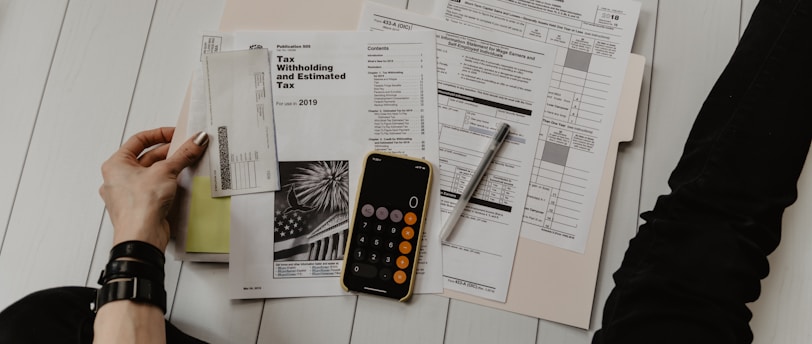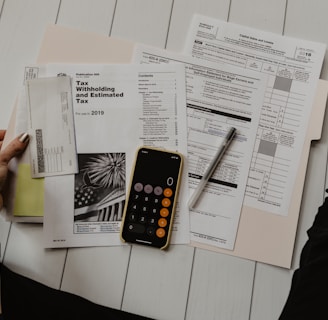How to avoid penalties on self assessment in the UK
Filing your self assessment tax return can be stressful, especially when you consider the potential penalties for mistakes or late submissions. However, with a clear understanding of the process and some practical steps, you can avoid these penalties and ensure a smooth filing experience. In this guide, we’ll cover everything you need to know about avoiding penalties on your self assessment in the UK.
8/20/20243 min read


Why you need to file a self assessment
A self-assessment tax return is required if you have income that isn’t taxed at source, such as income from self-employment, rental properties, or investments. Even if you’re employed and pay tax through PAYE, you may still need to file a self-assessment if you have additional income. It’s crucial to determine whether you need to file to avoid unnecessary penalties.
Understanding self assessment penalties
HMRC imposes penalties for various reasons, including late submissions, late payments, and inaccuracies in your return. Here’s a breakdown of the potential penalties:
1. Late filing penalties
Miss the deadline by 1 day: £100 fine.
3 months late: £10 per day for up to 90 days (maximum £900).
6 months late: £300 or 5% of the tax due (whichever is higher).
12 months late: Additional £300 or 5% of the tax due, with potential for higher penalties in serious cases.
2. Late payment penalties
30 days late: 5% of the unpaid tax.
6 months late: Additional 5% of the unpaid tax.
12 months late: Further 5% of the unpaid tax.
3. Inaccuracy penalties
If your tax return contains inaccuracies that result in underpaid tax, penalties can range from 0% to 100% of the underpaid tax, depending on whether the error was careless, deliberate, or deliberate and concealed.
Key deadlines to remember
Missing deadlines is one of the most common reasons for incurring penalties. To avoid this, keep track of the following key dates:
31st October: Deadline for submitting a paper tax return.
31st January: Deadline for online tax returns and for paying any tax owed for the previous tax year.
31st July: Deadline for the second payment on account, if applicable.
How to avoid self assessment penalties
Now that you understand the potential penalties, here are practical steps to avoid them:
1. Register early
If you’re filing a self-assessment for the first time, you’ll need to register with HMRC. This process can take up to 10 working days as HMRC will send you a Unique Taxpayer Reference (UTR) number by post. To avoid delays, register as soon as you know you need to file a self-assessment.
2. Keep accurate records
Maintaining accurate and detailed records of your income and expenses throughout the year is essential. This includes:
Payslips
Bank statements
Receipts for deductible expenses
Dividend vouchers
Good record-keeping helps you fill out your tax return accurately and reduces the risk of errors that could lead to penalties.
3. File your return on time
As mentioned, the deadline for filing your online self-assessment is 31st January. Mark this date on your calendar and aim to submit your return well in advance. Filing early also means you can spread the cost of any tax owed, as you’ll know the amount well before the payment deadline.
4. Pay any tax due on time
Ensure you have funds set aside to pay your tax bill by 31st January. If you think you’ll struggle to pay, contact HMRC as soon as possible to discuss a possible payment plan. Ignoring the issue can result in hefty penalties.
5. Double-check your return
Before submitting your tax return, take the time to review all the information. Ensure that all income is correctly reported and that you’ve claimed all the deductions you’re entitled to. Even small errors can lead to penalties, so a careful review is worth the effort.
6. Correct mistakes promptly
If you realise you’ve made a mistake on your tax return after submitting it, you have up to 12 months from the submission deadline to make corrections without incurring penalties. The sooner you fix any errors, the better.
7. Use our personalised guide
We make filing your self assessment easy and straightforward. Our service is designed to help you avoid common mistakes and penalties. For just £9.99, you can access a personalised, step-by-step guide tailored to your unique tax situation. By answering a few simple questions, you’ll receive a clear and concise guide that walks you through each stage of the self assessment process.
Why choose our service?
Tailored to your needs: Our guide is customised based on your specific circumstances, ensuring you receive relevant advice.
User-friendly: We break down complex tax rules into easy-to-understand steps, making the filing process stress-free.
Affordable: At just £9.99, our service offers exceptional value for money.
Avoiding self assessment penalties in the UK is all about being organised, aware of deadlines, and meticulous with your tax return. By following the steps outlined in this guide, you can significantly reduce the risk of incurring penalties and ensure that your tax affairs are in order.
For added peace of mind, let us help you navigate the self-assessment process. With our personalised guide, you can file your return with confidence and avoid common pitfalls. Contact us today to get started!
Simplify your self assessment today
Your self assessment made easy and affordable.
Ready to get started?
© 2024. All rights reserved.
